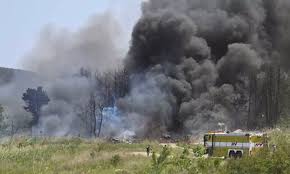At least 2 crew members dead after South Korean Navy plane crashes

Pohang, South Korea — May 29, 2025: A South Korean Navy maritime patrol plane crashed near the southeastern city of Pohang during a training flight on Thursday afternoon. At least two crew members died in the accident, which shocked the military community and raised questions about naval aviation safety.
The Crash: Training Flight Ends in Disaster
The P-3C Orion aircraft took off from a naval base in Pohang at 1:43 p.m. local time. Only six minutes later, it crashed near Sinjeong-ri, a hillside neighborhood in Pohang. Witnesses heard a loud explosion and saw thick black smoke rising from the crash site.
Firefighters and military rescue teams quickly arrived to battle the flames. They confirmed two crew members died immediately. The other two crew members initially went missing, but authorities later confirmed all four died in the crash.
The Navy grounded all P-3C aircraft and set up a task force to find out why the crash happened.
About the P-3C Orion
The P-3C Orion is a four-engine turboprop maritime patrol aircraft made by Lockheed Martin. Navies worldwide use it for anti-submarine warfare, reconnaissance, and search-and-rescue missions. It can carry torpedoes, depth charges, and anti-ship missiles.
South Korea operates both original P-3C models and upgraded P-3CK variants modified by Korea Aerospace Industries. These planes play a key role in monitoring the waters around the Korean Peninsula amid regional tensions.
Response and Safety Measures
The South Korean government expressed condolences to the families of the crew members. Officials promised a full and transparent investigation into the crash.
Emergency responders faced tough terrain near the crash site, but no civilians on the ground were hurt. The Navy is reviewing training protocols and aircraft maintenance records.
The investigation team includes military aviation experts and technical engineers. They are examining the flight data recorder and cockpit voice recorder recovered from the wreckage.
Aviation Safety Concerns
This crash follows a deadly passenger plane accident at Muan International Airport in December 2024. That crash killed almost all 181 people on board and remains one of South Korea’s worst aviation disasters.
Public concern about aviation safety has increased since then. Both civilian and military sectors now face pressure to improve safety standards. The Navy’s grounding of its P-3C fleet shows its commitment to safety.
Strategic Importance of Maritime Patrol
South Korea’s location makes maritime surveillance vital for national security. The Navy’s patrol planes monitor potential threats like North Korean submarines and illegal maritime activities.
The P-3C Orion helps cover large ocean areas during long missions. It has been essential for anti-submarine operations for decades.
The recent crash affects the Navy’s readiness. It also highlights the need to maintain strict safety practices.
Ongoing Investigation and Future Steps
The investigation will take several weeks. Officials will check for mechanical failure, pilot error, weather conditions, or other causes.
Experts note the short time from takeoff to crash points to pilot response and aircraft systems as key focus areas. They will also review recent maintenance logs.
Meanwhile, the Navy is conducting additional safety drills and improving emergency procedures.
National Mourning and Support
The nation mourns the loss of the crew members. The Ministry of Defense offers counseling and financial help to their families. Memorial services will honor the fallen.
People across South Korea expressed grief and solidarity online. Many urged stronger safety measures to prevent future accidents.
Conclusion
The crash near Pohang reminds everyone of the risks in military aviation. It stresses the need for constant vigilance in safety.
As the investigation moves forward, South Korea hopes to learn lessons that improve defense force safety and prevent further tragedies.
The country honors the bravery and sacrifice of its naval personnel and renews its commitment to protect those who serve.






